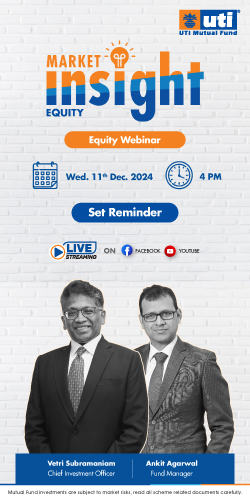Every business starts with an idea. However, just having an idea is no guarantee for success. Your vision needs actionable points. To ensure that you stay on the right track, you need a business plan for your advisory practice.
So let us see what goes into o business plan.
Setting goals
First and foremost, you need to pen down your goals. Your goals need to be actionable and concrete. For instance, I will accumulate Rs. 50 crore AUM in 2 years by tapping the mass affluent market with a minimum ticket size of Rs. 5 lakh. This is a more concrete goal than say, I will acquire 100 clients in 2 years.
Vinayak Sapre of Insights says that most IFAs do not have a business plan. “I have dealt with IFAs very closely and most of them don’t have a business plan. Having clear goals keeps you on your toes. You need to know in which direction you are heading,” says Vinayak.
Gajendra Kothari of Etica Wealth Management says that advisors need to have three plans. “Advisors need to ideally have three plans – best case scenario, worst case scenario and optimal case scenario before they start their business. You will not get a shock if you have planned in advance,” suggests Gajendra.
Gajendra suggests that advisors need to have a short term plan and a long term plan. “If you achieve short term goals, you will be able to replicate them over a long term,” he adds.
To a large extent, the fortunes of AMCs and your business is depended on markets. However, attributing your setbacks on bad market conditions can be hazardous for your business. Your goals have to be such that they are not depended on markets. You need to have a strategy to acquire the desired number of clients within a specified period of time irrespective of whether markets are bad or good. In fact, a few IFAs say that businesses are best built in bad market conditions and that is the time when your clients need you the most.
SWOT analysis
As you might be starting solo you would do well to evaluate where you stand, more precisely do a Strength, Weakness, Opportunities, Threats (SWOT) analysis.
It is advisable not to venture into something where you lack expertise or only have a limited expertise. Before venturing into an uncharted territory study the market well.
Let’s look at how a typical SWOT analysis for an IFA would look like:
Strengths
- I have good contacts which will help me get clients
- I have the right qualifications and expertise to succeed in this profession
- I’m a good story teller and l like interacting with people
Weakness
- I don’t have the required capital to fund my business
Opportunities
- Mutual fund penetration is abysmal and this presents a huge opportunity to be tapped
- Many people are looking for unbiased advice on their finances and there is a lacuna of quality professionals in this industry
- Government may encourage people to invest in mutual funds by providing tax incentives and this will create a huge demand for mutual funds
- Markets are likely to be in a secular bull run and there is likelihood of investors appetite for mutual funds going up
Threats
- I may face competition from banks, other established players and online channels
- Clients may move to direct plans
- The regulator may do away with commissions from manufacturers which will require me to charge fee from clients
- Compliance cost may go up
As you can see, strength and weakness are internal while threats and opportunities are external factors influencing your business. Analyzing your strengths and weakness will help you identify your niche and offer the best services to your clients based on your abilities and strengths. Anticipating threats and preparing well to tap the opportunities will help you be in control of your business. You will not be caught unawares.
Resources
After SWOT analysis, you need to know the resources (office, employees, infrastructure, software, etc.) required for realizing your goals and how will you raise these resources. Normally, most IFAs start from their home and buy an office space after they reach a certain size. This will depend on your business model.
However, this is not advisable in most cases. Historically, most IFAs put in little or no resources in the business except their time. As a result of this underinvestment, they are caught in a perpetual cycle of ‘low investments, low returns’. What is the point in saving Rs. 5000 on a messenger when you could use the same time to canvass business and earn an extra Rs. 10,000!
This is one of the most important decisions you will make so it is worthwhile for you to deliberate on this.
Action points
Once you have clear goals, you need to chart out a game plan to realize your dream. For instance, if you are aiming to accumulate Rs. 25 crore AUM in the first year, how will you go about getting clients? Who are your ideal clients and how will you reach out to them?
You need to prepare a roadmap for reaching your goals. Your action points could be:
- I will draw up a list of people who could be my ideal clients
- I will organize investor awareness camps to reach out to clients
- I will write in media to build trust and visibility
- I will start my company website
- I will blog and solve people’s queries regarding their finances through social media
- I will join a local club or association to expand my network
Ask yourself
You are getting into a territory where there are already hundreds of advisors. You need to ask yourself many questions. For instance, Why am I getting into this venture? What differentiation do I have to offer? What sets me apart from others? What is my USP? and so on. This will help you realize your goals faster.
Monitor & Review
Just the way you monitor and review your client’s portfolio, your business also needs a review. You need to periodically monitor your goals and make course correction wherever required. This will help you stay on track and evaluate your assumptions. “I had started with a plan when I entered this profession. I have achieved 70% of my goals. Now we are evaluating where we lagged. Having a business plan helps you remain focused,” adds Gajendra.
"One needs to have one year and three year plans which need to be monitored at regular intervals. The process of making business plan also helps in identifying your key strengths and weaknesses,” adds Vinayak.
We hope the above pointers give you a fair understanding about the importance of having a business plan. Share your views.





